- Home
- George R. R. Martin
Joker Moon Page 23
Joker Moon Read online
Page 23
Grigori took the microphone from Sergei. “This is Kolesnikov. Who is on duty?”
Sergei said, “Pavlov,” which Grigori could have guessed. He pictured Pavlov and a group of his deputies clustered around a console at the Crimean Station—exchanging worried glances.
After the lag: “Greetings, Comrade Commander! This is Control Twenty”—for security reasons, all Crimean operators were identified by number; twenty was indeed Pavlov—“so nice to hear your voice! We were afraid you were … ill.”
He meant “unhappy with us,” which was obvious. “Greetings, Twenty,” Grigori said, in his most professional voice. “Please shift to channel two.” Channel two was an encrypted link available to Crimea and the cosmonauts.
“This is Kolesnikov. Viktor and Terenty are dead.” Allowing for the lag and the dire nature of the news, Grigori gave the basic details, which were naturally shocking to Control. “The circumstances will be less mysterious if we can all speak to Comrade Polyakov of State Security.”
A long lag, and then these words: “He is standing by, as you requested.”
Then Grigori heard a new voice, patched in. Polyakov.
Grigori quickly recounted the appearance of the Moon Maid, and the events with Viktor … or Aarti, whoever that was.
Polyakov accepted the bizarre narrative without apparent surprise and with few comments. Grigori wondered how many similar stories the wild card spy had lived through. “I have no idea how to fight a phantom who has already killed two of my men and wants to terminate my mission,” he told Polyakov.
“You are in a unique situation,” Polyakov said.
That was worse than useless. He had discerned that much by himself.
“Is it possible this phantom is an alien? A Swarm remnant, or even a Takisian of some sort?”
“Possibly,” said Grigori. “Some of the Swarmlings took on human form. This thing looked like Viktor. Sergei saw a woman. Beautiful, with dark hair, wearing a sari. Did the Swarmlings wear saris?”
“It is possible a Swarm bud landed in India. We will need to make further inquiries. It is also possible you are dealing with an ace of some sort. Some of the American aces are capable of flying through space. We have files on Pulse and Starshine. This may be another. A new one, possibly Indian.”
“Viktor did not fly away. He turned to dust.”
Pavlov must have taken the microphone. “This is Twenty again. Whether this creature is an alien or a powerful ace, it is an enemy of the Soviet Union. If it appears again, you are authorized to capture or kill it, whichever seems most practical. We are prepared to declare the mission a success and allow you to lift off at the first opportunity.”
“Understood,” Grigori said. And then, as the link faded, “Kolesnikov, out.”
“There’s a launch window every twenty-four hours,” Sergei said moments later.
“To get us back to Earth in one piece, yes,” Grigori said. “But we could land in the Himalayas, or the middle of the Pacific.”
“Or in Washington, D.C.,” Belka said, smiling wickedly.
“Only once a week do we have windows that would get us to landing zones in Russia.”
“When is the next one?”
“Tomorrow,” Belka said. He held up a notepad.
Happier than he’d seemed in two months, Sergei slid off his perch. “Then let’s listen to Control, and go home!”
“No,” Grigori said.
Before he could drive home the message, Belka spoke up. “How can we leave while that thing is outside?”
“What other choice do we have?”
Grigori poked Sergei in the shoulder. “We’re soldiers, aren’t we?”
“You might be,” Sergei said. “You’re trying to protect your bonus even if it kills us!”
Grigori was stunned by this statement, partly because it showed that Sergei was fighting back. But also because it was true. Maya had resisted the idea of Grigori’s participation in the Luna mission until learning that the bonus for it was 100,000 rubles—twenty years’ income. Suddenly there were no more complaints about Grigori’s travel for training, the trips to Kazakhstan that she mistakenly believed to involve sexy local women. “You have your own bonuses and rewards. If not money, then a flat, a car, prizes—”
Belka ended the argument. “Toys and money won’t matter if we don’t figure out how to destroy this thing.”
Sergei couldn’t continue to argue.
Fighting a phantom left few options, given their limited equipment. “If she was truly a ghost, there wouldn’t be anything we could do,” Grigori said.
“And we wouldn’t have a problem,” Belka said. “A physical presence means she is vulnerable to physical actions.”
“Even so,” Grigori said, “we can’t shoot her because we don’t have guns.” He ticked off the options aloud in the hopes that one of the trio might have a solution. “We have no explosives, and no chemicals we could even mix into explosives or flammables, so we can’t bomb her. She doesn’t appear to need oxygen, so we can’t trap her and suffocate her.” He happened to glance at the nutrient bags. “Maybe we could poison her.”
“She talks,” Belka said. “Sergei could bore her to death.” Sergei ignored the insult, which Grigori took as a sign that he was concentrating on solutions.
“I’m thinking heat,” Grigori said, “or electricity.”
Then they heard a sad pop from somewhere beyond the support tent. Lights and power died.
Grigori’s first fear was that Aarti had returned and was on the attack. But then he glanced at the patch panel and saw flipped fuses. Their systems were failing, as usual.
During his Zarya orbital mission, Grigori had experienced a similar event when fuses blew on a panel and left the station powerless, dark, and potentially adrift. The same thing could have happened in his flat near Moscow, but there a few minutes or even hours without power was only a common inconvenience.
On Zarya, every minute without power brought the cosmonauts a minute closer to suffocation. That danger existed here, though Sergei’s unique oxygen-generating ability meant that Grigori and Belka, and Sergei, were more likely to freeze first.
Without being told, within minutes, working skillfully in the all-too-silent dark, Belka was able to power up lights and an air pump. “But we’re on batteries now,” he said.
Sergei was understandably agitated. “How long will they work?”
“Four hours, maybe six if the commander and I are not here.”
“Now we have to move to Luna.”
“Pack up,” Grigori said. “Meanwhile, Belka and I will deal with our phantom. We will be ready to launch at the first opportunity.”
Over the next two hours, mindful of the clock ticking toward Aarti’s potential return five hours hence, Grigori and Belka went through their suiting, with Sergei’s help.
Finally all three were suited, though Sergei still had his helmet off, since he would be breathing residual CO2 as he closed up a pair of equipment cases. As Belka headed to the air lock, Grigori said, “Wait.” He took Belka’s and Sergei’s hands. “We sit.”
Neither joker had to be reminded of the tradition, especially in these circumstances. They joined Grigori in sitting on the hard-packed floor for a moment, in silence.
Then Grigori rose. “Good luck to all of us.”
Grigori and Belka stepped into the patched air lock and started the depress.
As they made their way, slip-sliding up the pipeline, then left toward the science station, Grigori realized that half-sized Belka seemed born for Moon excursions. In spite of the grim circumstances, the little joker skipped and loped with an ease Grigori could only envy. Of course, Grigori’s suit weighed three times what Belka’s did—and Grigori was still exhausted from the prior excursion. But it seemed that the Moon might be a better home for jokers than for nats.
Belka was clearly feeling it, too. “It feels good to get out of the tents. I should have done this more often.”
Then,
in his peripheral vision, Grigori saw Belka stop.
“It’s a fucking banyan tree.” He pointed.
Grigori raised his head and squinted.
It was indeed a tree, and a strange, multibranched sort. Typical of Belka to know that; even though Grigori had orbited the Earth for months, he had never been out of the Soviet Union except to fly missions over Bulgaria.
As they got closer, it proved to be more of a three-dimensional sketch of a banyan, in bold, primary colors, than a “real” one. And yet—
“It’s not an illusion,” Belka said, brushing aside several branches and tapping on the trunk.
“Can you explain this?”
“I have a sad Soviet imagination, sorry.” Belka tried to push the banyan over with his shoulder. “Roots, too.”
“Our phantom has other powers.”
“We might have expected that.”
Grigori felt sick. “Could this Indian ghost be the work of the Swarm?”
“Viktor would have known,” Belka said, a revelation that surprised Grigori, but shouldn’t have. “But I suspect not. This…” Belka waved at the tree. “This is just deranged art.”
“I’ll take a picture. You get samples.”
Belka was preparing to do just that.
It was a struggle for Grigori just to reach, then raise the camera. He hoped that the charged-coupled-device card could still collect an image. Click click on the banyan as Belka scraped pieces of bark into a bag. “Now what?”
“We set our trap.”
The science station was just ahead.
The work was simple in theory, but even spreading the mesh took more time than Grigori would have believed. Belka found it difficult to reroute the leads on the power system as Grigori struggled just spreading soil over the mesh to hide it.
“Done,” Belka said, finally.
Grigori was on his hands and knees. Hearing Belka’s announcement, he literally lowered his helmet faceplate to the ground, collapsing for a moment.
“Careful, Commander. The grid is hot.”
“Maybe I was hoping to test it.” He had thought about death many times in his career, from his first solo flight in a Yak-11 through every combat assignment, and especially the night before he launched on his Zarya mission.
On the Moon he’d been so exhausted that the possibility of death seemed welcome. Not today: he wanted to kill this Indian avatar then go home.
With Belka following, Grigori headed back toward the pipeline and was within a few meters—within sight of both Luna to their left and the hab to their right—when he stumbled. It was strange, because he was standing still.
And then the whole Moon seemed to shudder and shake. Grigori felt like a sailor on a ship’s deck in a storm, rising and falling. Only the rigidity of the suit kept him from pitching forward.
“Belka!”
“Behind you!”
Then it was over. Grigori turned to ensure that Belka was still upright, which he was. Then: “Sergei, did you feel that?”
There was no answer, only static.
And then he saw it striding past, no more than a hundred meters away.
This being was taller than a human by at least a head, and bulky enough to weigh 150 kilograms on Earth. It was wearing a blouse and a vest of armor.
“Do you see that?” Grigori asked.
“Yes.”
“What is it?”
“If I remember correctly, some kind of Hindu demon. Rakshasa.”
“Our Indian ace.” He felt as much anger as he did fear.
To Grigori’s horror, the Hindu demon strode directly toward the hab tents. “Sergei! It’s coming your way!”
But now his headphones filled with popping as the demon attacked the hab tent, literally ripping it open. The whole structure collapsed as if squashed by a giant hand.
The demon waded into the wreckage, throwing their precious tanks and instruments over his shoulder.
A helmet landed at Grigori’s feet. Sergei’s.
Grigori could see into the support tent, still a bright spot against the dark gray moonscape—and there was Sergei, helmetless, arms wrapped around himself as if battling a gust of cold wind.
Which he was. The protective covering simply flew off, torn by the escaping air, which left Sergei completely exposed, along with all their equipment.
The flap to the cave tore loose, too.
Now Sergei stood, frozen, eyes wide—like a Gulag prisoner in a Siberian winter. Dead, of course.
And the demon rooted around in the wreckage like a boar.
Grigori wanted to take his shovel and attack the creature, but knew he would fail. To Belka he said, “Get to Luna. Start the prelaunch checklist.”
“What about you?”
“Someone’s got to lead that thing to the trap.”
“If we both run now, we can get away.”
“It will take an hour to prep Luna, and the window isn’t open yet. There’s no point in lifting off only to miss Earth.”
Belka seemed unconvinced. Grigori said, “And if we don’t eliminate this thing, it will be waiting for the next crew, and the next.”
“Special forces will get her.”
“Follow my orders.”
There was a moment. Then the little joker executed a salute, even though the suit’s restrictions prevented his hand from touching his helmet. “As you wish, Comrade Colonel.”
Belka turned to go.
Telling himself to concentrate on the task before him, and nothing else, Grigori waved his arms and ran toward the ruined habitation.
Until the Rakshasa saw him and began to extract itself from the tangle of fabric and equipment. Grigori reversed course and headed for the science station. He slipped frequently, falling to his hands and knees at least twice. The second time he risked a glance behind him.
The demon was in motion now, making big strides and gaining on him. Grigori would have to move faster than ever to reach the station before it caught him.
He pushed off and ran, fell, and stumbled toward the station and the trap. “Belka, do you read?”
“I am in the cabin and working the checklist. We can launch as soon as you get here.”
“Can you see the Rakshasa?”
A long pause. Grigori took one, two, three loping steps.
“Yes! Behind you—!”
In the last five meters, he tripped and landed on his face, skidding so close to the electrified mesh that he imagined he could feel a hot surge through his gloves. Wouldn’t that have been stupid? To die in his own trap!
Not daring to look back again, Grigori rolled and crab walked to one side, hoping to get to the far side of the web. He had just gotten to his feet and saw the demon looming in front of him, close enough to touch, when there was a flash of light from Luna.
For a moment Grigori feared that the demon had thrown something and struck the vehicle.
But no: The Hindu demon stopped its pursuit and stared toward the vehicle. “What happened?” Grigori said as he dragged himself to the other side of the web.
“I fired two steering rockets.” Ah, Belka, so smart! One on each side so Luna didn’t tip over. “We only have sixteen minutes until the window opens.”
“Launch when ready.”
“I’ll launch when you’re here!”
“You know the order. Now shut up and let me do my job!” That, after all, was the best a commander could do.
He faced the Rakshasa across the thirty meters of hidden web. The demon glanced at the science packages scattered around the site as if trying to determine what they were. Grigori wished they were laser cannons.
All he had was his shovel.
His head was beginning to hurt.
He waved at the demon. Come get me!
It seemed to hesitate. Grigori tried to imagine the entity controlling the demon—could she see through its eyes? Hearing was impossible.
Could she feel?
He hoped so.
He took a step toward
the demon, and now it finally seemed to see him.
At that instant there was an arc from one of the instruments. Was the power dying? The web useless?
Grigori no longer cared: he was going to kill this thing if he had to use his hands.
Before he could step on the web, the Rakshasa did.
It was still working. The demon seemed to freeze, shudder. For the first time Grigori could see its face, and what he saw was surprise.
Then the Rakshasa exploded. A ball of white light enveloped them both.
He was on his back. He ached. He smelled something burning, no doubt part of his suit.
His faceplate was clouded, but still intact.
He rolled to one side and, painfully, pushed himself to his feet. The Hindu demon was gone; a rough circle of glazed lunar soil marked where it had been.
Luna was gone.
He had some memory of Belka’s voice calling his name over and over again.
So this was it. He was going to die on the Moon. Given the pain in his skull, the ache in every joint, and the ominous sounds from his suit—clearly there was a leak—he was doomed.
The Moon was no place for him, for nats. Leave it to the jokers. He walked back to the dust pond that had swallowed Terenty and Viktor. Pictured Maya, Sasha. Even that was difficult.
Grigori sat down in the dust and began to slide slowly, strangely, almost sweetly into darkness.
The Moon Maid
PART V
1987
SHE HADN’T MEANT TO kill anyone. That was what Aarti told herself at first.
Aarti had watched the alien Swarm attack in ’85 from her house in Bombay, crouched over the small black-and-white TV in the kitchen where Saila liked to watch tearjerker movies while she cooked. Aarti held her breath, terrified that they would come to the Moon, but they had bypassed it entirely, focusing their attention on Earth. When the attack was over, she breathed a sigh of relief.
She should have felt bad for the humans killed in the battle, but those days, it was hard to feel much of anything. Aarti was numb, inside and out. Food held no savor for her, no matter how hard Saila worked to make it appealing. She hadn’t taken a ride in the car since Yaj was killed, or gone out to the market. She spent her days dozing in her bed, waiting for the moment when she could wake up on the Moon. Her servants lived their lives, sent their children off to school. Unlike Manju and Yaj, they didn’t try to involve Aarti in their days, and Aarti was grateful for that.

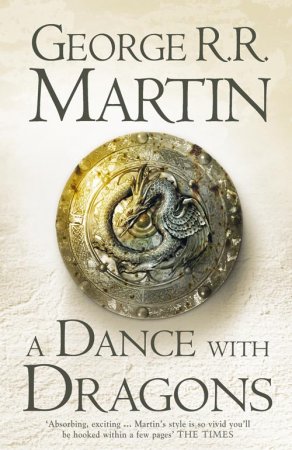 A Dance with Dragons
A Dance with Dragons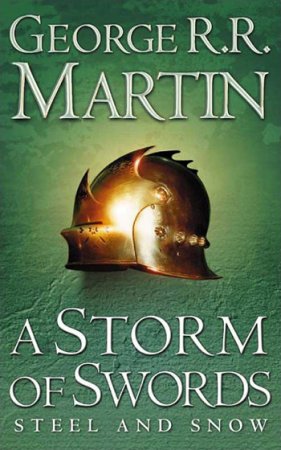 A Storm of Swords
A Storm of Swords A Feast for Crows
A Feast for Crows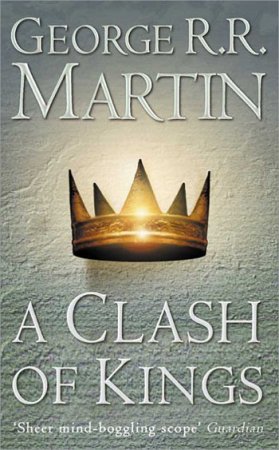 A Clash of Kings
A Clash of Kings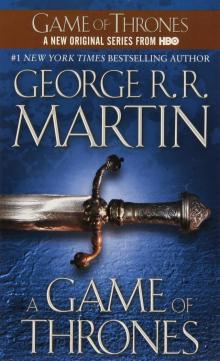 A Game of Thrones
A Game of Thrones Mississippi Roll
Mississippi Roll Wild Cards V: Down and Dirty
Wild Cards V: Down and Dirty Busted Flush
Busted Flush When the Devil Drives
When the Devil Drives Dying of the Light
Dying of the Light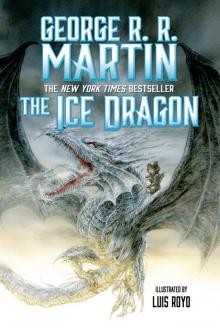 The Ice Dragon
The Ice Dragon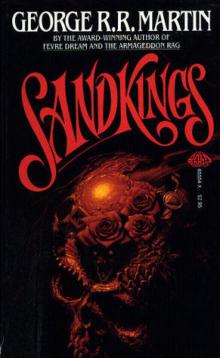 Sandkings
Sandkings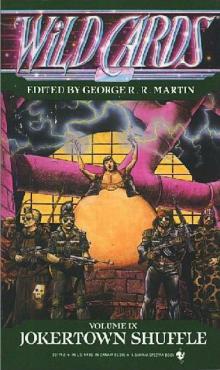 Jokertown Shuffle
Jokertown Shuffle Dreamsongs. Volume II
Dreamsongs. Volume II Deuces Down
Deuces Down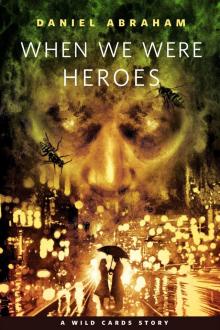 When We Were Heroes
When We Were Heroes Warriors
Warriors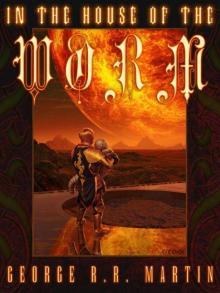 In the House of the Worm
In the House of the Worm Death Draws Five
Death Draws Five Dreamsongs. Volume I
Dreamsongs. Volume I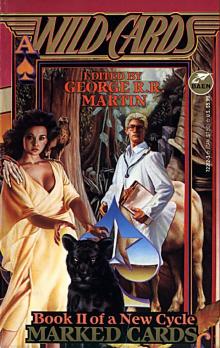 Marked Cards
Marked Cards Dreamsongs
Dreamsongs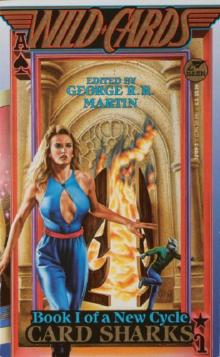 Card Sharks
Card Sharks Dangerous Women
Dangerous Women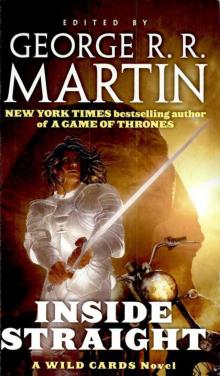 Inside Straight
Inside Straight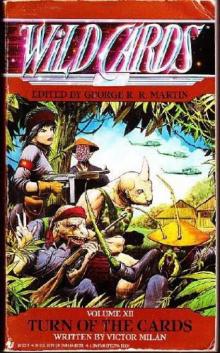 Turn of the Cards
Turn of the Cards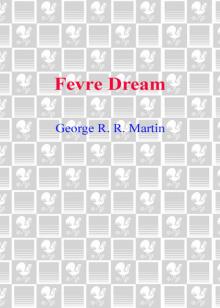 Fevre Dream
Fevre Dream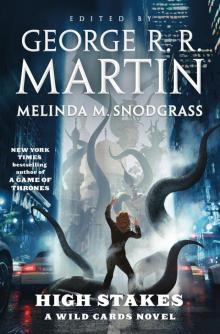 High Stakes: A Wild Cards Novel
High Stakes: A Wild Cards Novel Windhaven
Windhaven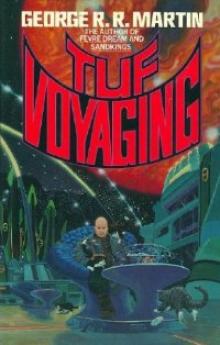 Tuf Voyaging
Tuf Voyaging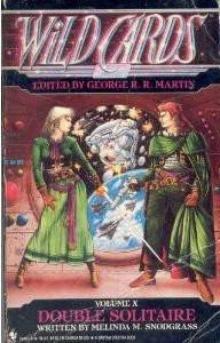 Double Solitaire
Double Solitaire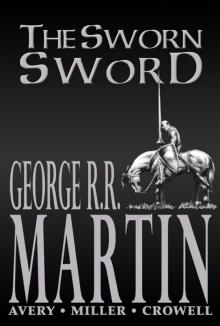 The Sworn Sword
The Sworn Sword Low Chicago
Low Chicago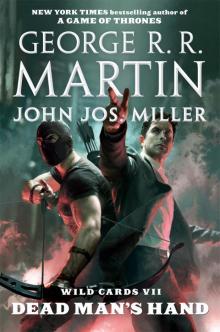 Dead Man's Hand
Dead Man's Hand Wild Cards
Wild Cards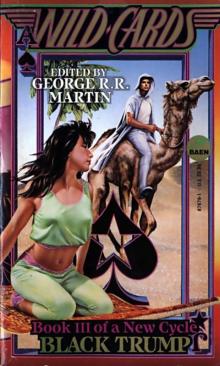 Black Trump
Black Trump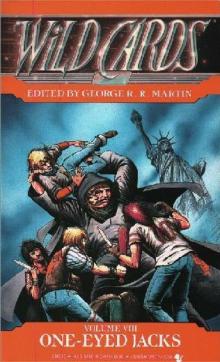 One Eyed Jacks
One Eyed Jacks Wild Cards: Aces Abroad
Wild Cards: Aces Abroad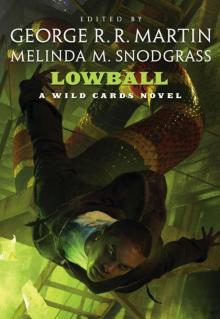 Lowball: A Wild Cards Novel
Lowball: A Wild Cards Novel Double Solitaire (2019 Edition)
Double Solitaire (2019 Edition) Dealer's Choice
Dealer's Choice Ace in the Hole
Ace in the Hole A Song for Lya: And Other Stories
A Song for Lya: And Other Stories Three Kings
Three Kings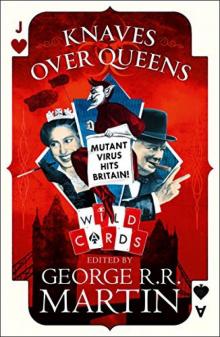 Knaves Over Queens
Knaves Over Queens Joker Moon
Joker Moon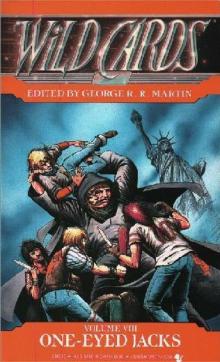 One Eyed Jacks wc-8
One Eyed Jacks wc-8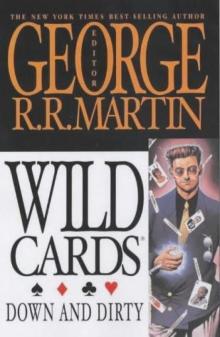 Down And Dirty wc-5
Down And Dirty wc-5 Mississippi Roll_A Wild Cards Novel
Mississippi Roll_A Wild Cards Novel A Feast for Dragons
A Feast for Dragons The Sworn Sword ttodae-2
The Sworn Sword ttodae-2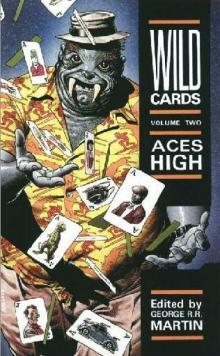 Aces High wc-2
Aces High wc-2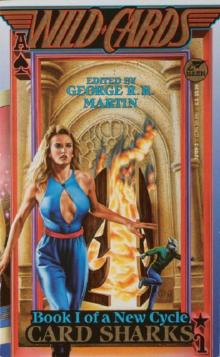 Wild Cards 13 : Card Sharks
Wild Cards 13 : Card Sharks Way of the Wizard
Way of the Wizard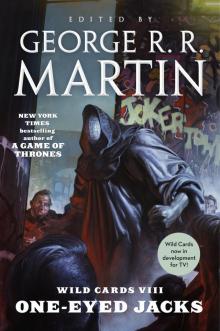 Wild Cards VIII: One-Eyed Jacks
Wild Cards VIII: One-Eyed Jacks A Dance With Dragons: Book 5 of A Song of Ice and Fire (Song of Ice & Fire 5)
A Dance With Dragons: Book 5 of A Song of Ice and Fire (Song of Ice & Fire 5) The Princess and The Queen, Or, The Blacks and The Greens (a song of ice and fire)
The Princess and The Queen, Or, The Blacks and The Greens (a song of ice and fire) Wild Cards VI--Ace in the Hole
Wild Cards VI--Ace in the Hole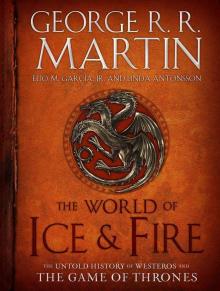 The World of Ice & Fire: The Untold History of Westeros and the Game of Thrones (A Song of Ice and Fire)
The World of Ice & Fire: The Untold History of Westeros and the Game of Thrones (A Song of Ice and Fire)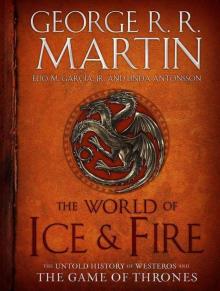 The World of Ice & Fire: The Untold History of Westeros and the Game of Thrones
The World of Ice & Fire: The Untold History of Westeros and the Game of Thrones Busted Flush wc-19
Busted Flush wc-19 A Knight of the Seven Kingdoms
A Knight of the Seven Kingdoms Nightflyers: The Illustrated Edition
Nightflyers: The Illustrated Edition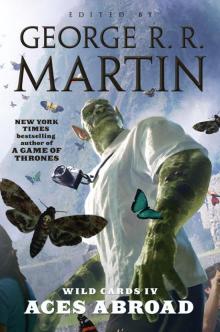 Wild Cards IV
Wild Cards IV Portraits of His Children
Portraits of His Children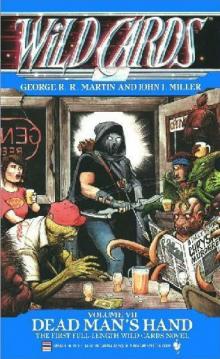 Dead Mans Hand wc-7
Dead Mans Hand wc-7 Jokers Wild wc-3
Jokers Wild wc-3 The Lonely Songs of Laren Dorr
The Lonely Songs of Laren Dorr Wild Cards III: Jokers Wild
Wild Cards III: Jokers Wild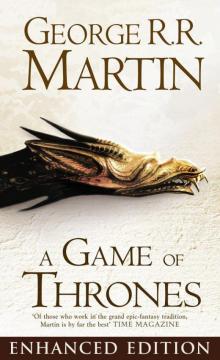 A Game of Thrones Enhanced Edition
A Game of Thrones Enhanced Edition Nightflyers & Other Stories
Nightflyers & Other Stories Armageddon Rag
Armageddon Rag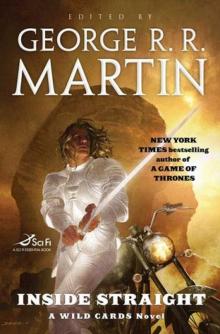 Wild Cards: Inside Straight
Wild Cards: Inside Straight A Song for Lya
A Song for Lya A Dance with Dragons: A Song of Ice and Fire: Book Five
A Dance with Dragons: A Song of Ice and Fire: Book Five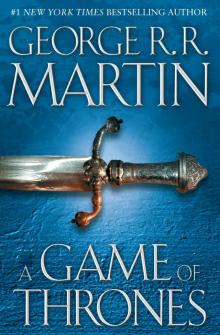 Song of Fire & Ice 01 - A Game of Thrones
Song of Fire & Ice 01 - A Game of Thrones Death Draws Five wc-17
Death Draws Five wc-17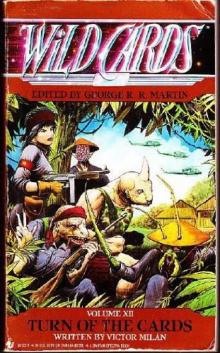 Turn of the Cards w-12
Turn of the Cards w-12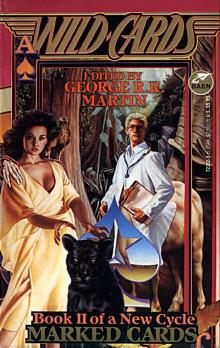 Wild Cards 14 - Marked Cards
Wild Cards 14 - Marked Cards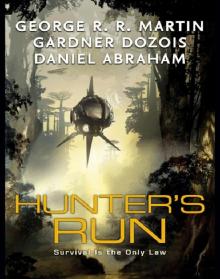 Hunter's Run
Hunter's Run The Glass Flower
The Glass Flower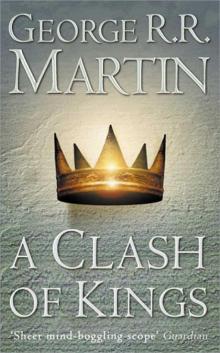 A Clash of Kings asoiaf-2
A Clash of Kings asoiaf-2 A Game of Thrones 5-Book Bundle: A Song of Ice and Fire Series: A Game of Thrones, A Clash of Kings, A Storm of Swords, A Feast for Crows, and A Dance with Dragons (Song of Ice & Fire)
A Game of Thrones 5-Book Bundle: A Song of Ice and Fire Series: A Game of Thrones, A Clash of Kings, A Storm of Swords, A Feast for Crows, and A Dance with Dragons (Song of Ice & Fire) Ace In The Hole wc-6
Ace In The Hole wc-6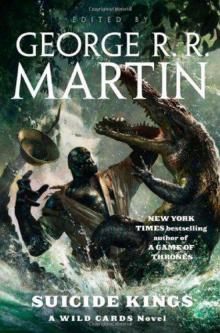 Suicide Kings wc-20
Suicide Kings wc-20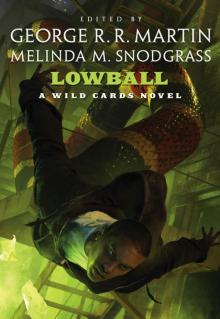 Lowball
Lowball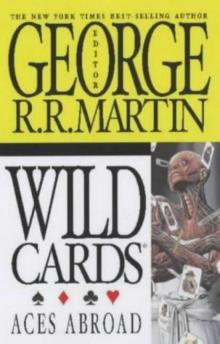 Aces Abroad wc-4
Aces Abroad wc-4 George R. R. Martin's a Game of Thrones 4-Book Bundle
George R. R. Martin's a Game of Thrones 4-Book Bundle A Feast for Crows asoiaf-4
A Feast for Crows asoiaf-4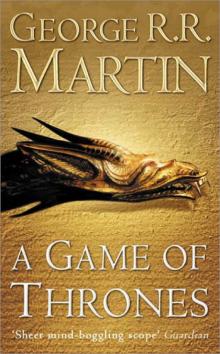 A Game of Thrones asoiaf-1
A Game of Thrones asoiaf-1 The Mystery Knight ttodae-3
The Mystery Knight ttodae-3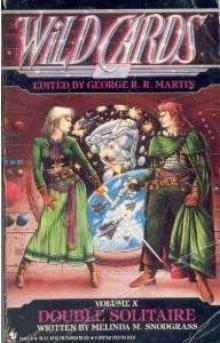 Double Solitaire w-10
Double Solitaire w-10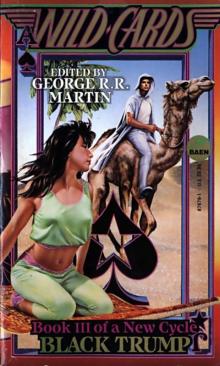 Wild Cards 15 - Black Trump
Wild Cards 15 - Black Trump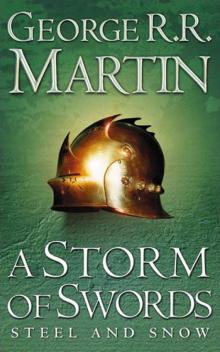 A Storm of Swords asoiaf-3
A Storm of Swords asoiaf-3 The Hedge Knight ttodae-1
The Hedge Knight ttodae-1 Dreamsongs 2-Book Bundle
Dreamsongs 2-Book Bundle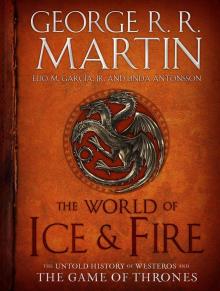 The World of Ice & Fire
The World of Ice & Fire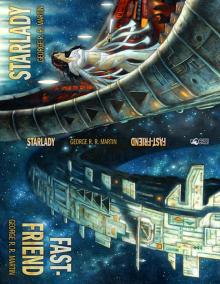 Starlady & Fast-Friend
Starlady & Fast-Friend Old Mars
Old Mars Fantasy For Good: A Charitable Anthology
Fantasy For Good: A Charitable Anthology Wild Cards V
Wild Cards V A Dance with Dragons asoiaf-5
A Dance with Dragons asoiaf-5 Dealer's Choice w-11
Dealer's Choice w-11 The Book of Magic
The Book of Magic A Game of Thrones 4-Book Bundle
A Game of Thrones 4-Book Bundle Texas Hold 'Em
Texas Hold 'Em Wildcards wc-1
Wildcards wc-1 Rogues
Rogues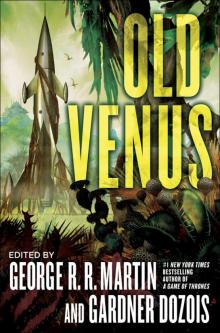 Old Venus
Old Venus